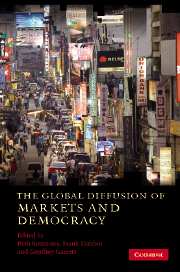Book contents
- Frontmatter
- Contents
- List of appendixes
- List of figures
- List of tables
- Notes on contributors
- Acknowledgements
- 1 Introduction: the diffusion of liberalization
- 2 Tax policy in an era of internationalization: an assessment of a conditional diffusion model of the spread of neoliberalism
- 3 The decision to privatize: economists and the construction of ideas and policies
- 4 The international diffusion of public sector downsizing: network emulation and theory-driven learning
- 5 Global ideology and voter sentiment as determinants of international financial liberalization
- 6 Competing for capital: the diffusion of bilateral investment treaties, 1960–2000
- 7 Diffusion and the spread of democratic institutions
- 8 World society and human rights: an event history analysis of the Convention on the Elimination of All Forms of Discrimination against Women
- 9 Conclusion
- Index
- References
9 - Conclusion
Published online by Cambridge University Press: 04 August 2010
- Frontmatter
- Contents
- List of appendixes
- List of figures
- List of tables
- Notes on contributors
- Acknowledgements
- 1 Introduction: the diffusion of liberalization
- 2 Tax policy in an era of internationalization: an assessment of a conditional diffusion model of the spread of neoliberalism
- 3 The decision to privatize: economists and the construction of ideas and policies
- 4 The international diffusion of public sector downsizing: network emulation and theory-driven learning
- 5 Global ideology and voter sentiment as determinants of international financial liberalization
- 6 Competing for capital: the diffusion of bilateral investment treaties, 1960–2000
- 7 Diffusion and the spread of democratic institutions
- 8 World society and human rights: an event history analysis of the Convention on the Elimination of All Forms of Discrimination against Women
- 9 Conclusion
- Index
- References
Summary
The concurrent rise of liberal politics and free market economics around the world was a defining feature of the latter part of the twentieth century. The social sciences were not well positioned to explain this global phenomenon. Models of policymaking and political change had privileged domestic factors for at least half a century. From Lipset's view of democracy as the product of economic modernization within countries to Shonfield's division of the world into divergent national capitalisms, the underlying meta-model of political and policy change was one of unconnected domestic processes.
As democracy and markets swept to the four corners of the globe, the limitations of purely domestic models became increasingly apparent. Countries democratized that Lipset would have considered too poor to do so. Chile and the United Kingdom, countries that Shonfield would surely never have associated as kindred capitalist spirits, led the world in privatization and deregulation. Phenomena such as these led pundits to propose common exogenous forces as the driver of global political and economic change. Globalization, fueled by technological innovations lowering costs to international exchange of goods, services, capital, and information, was seen as forcing governments to embrace the market and as undermining economically inefficient authoritarian regimes – leading to “the end of history,” in Fukuyama's famous formulation.
But the grandiose claims about the ubiquity of liberalism soon came to be challenged by events, notably anti-globalization protests and anti-modernity terrorist attacks.
- Type
- Chapter
- Information
- The Global Diffusion of Markets and Democracy , pp. 344 - 360Publisher: Cambridge University PressPrint publication year: 2008
References
- 8
- Cited by



